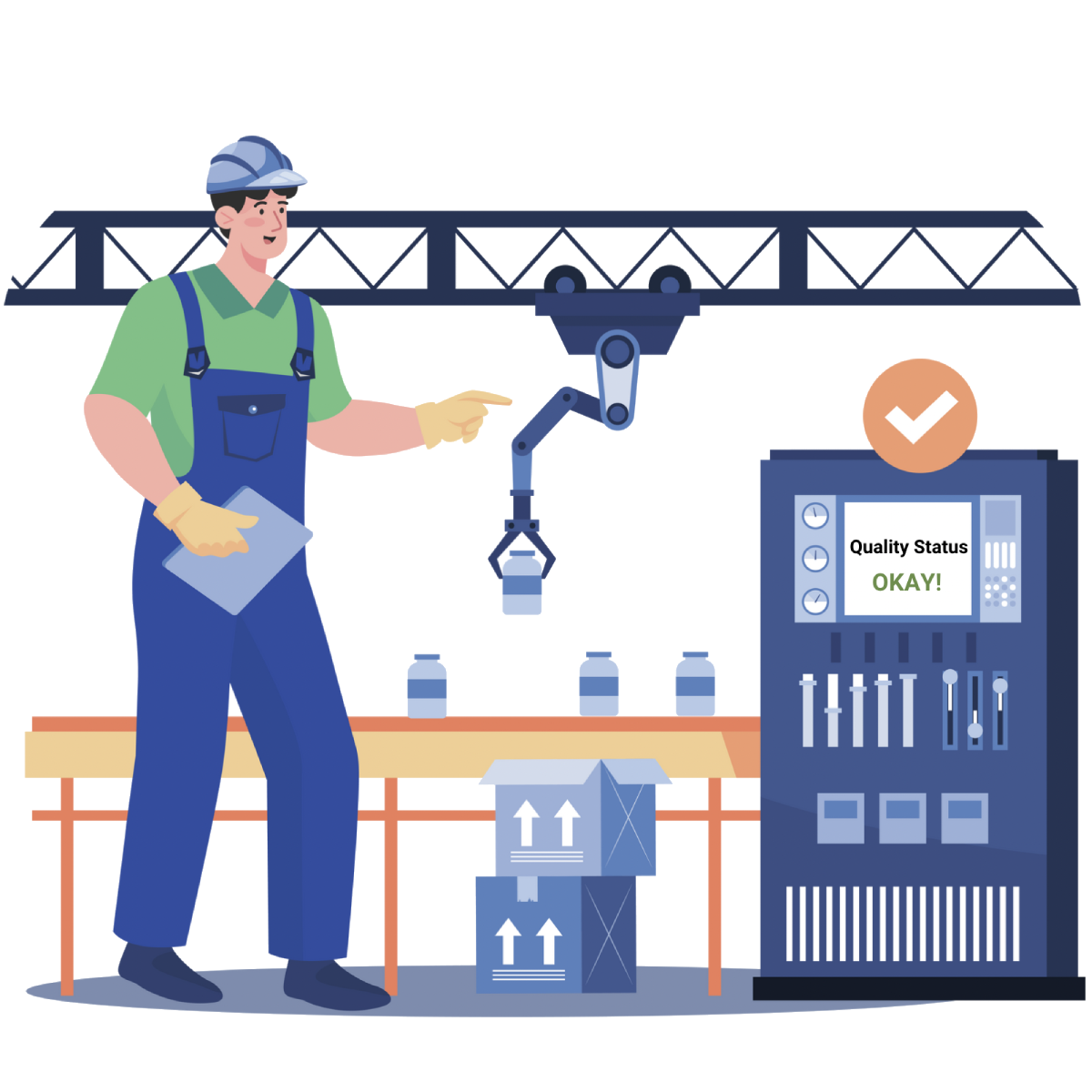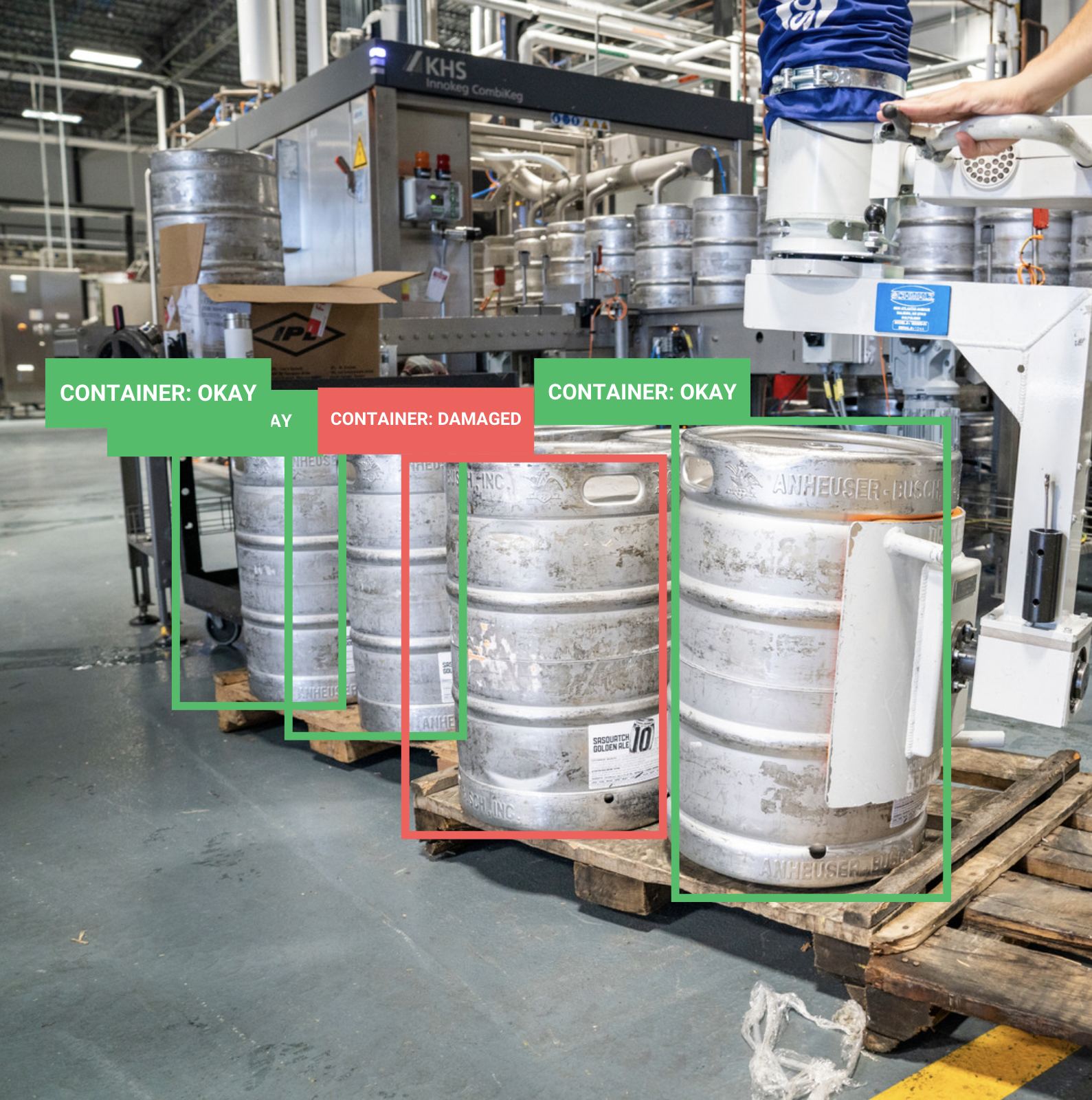Explore 20+ AI Solution Prototypes at Our AI Demo Central |
At ThirdEye, we are transforming how manufacturers ensure product quality by deploying AI-powered quality control systems that leverage the power of computer vision, machine learning, and generative AI. These systems automatically inspect products for defects in real-time, ensuring that every item meets precise quality standards before leaving the production line.
Our AI-driven solutions analyze data from high-resolution cameras and industrial sensors, combining it with historical data to identify defects, predict potential quality issues, and enable manufacturers to make real-time adjustments to the production process. This proactive approach significantly improves accuracy, speed, and consistency in detecting defects and reducing waste, which directly impacts the ROI.

Our AI-powered systems are designed to seamlessly integrate into existing production environments, automating the inspection process and delivering actionable insights. Here’show the core technologies work together to provide unparalleled quality control:
Computer vision technology is at the core of our automated quality control solutions. This technology enables the system to "see" and process visual data from the production line in real-time.
High-resolution industrial camerasare strategically placed to capture detailed images of products as they move through the assembly process. These images are then analyzed using advanced visual data processing algorithms to detect any surface-level defects like scratches, dents, incorrect assembly, or irregularities in shape or size.
Our deep learning modelsenhance the ability of the system to identify even the smallest flaws that might be missed by human eyes. By continuously comparing real-time images to an ideal product model, the system can quickly and accurately flag any deviations, ensuring that only high-quality products proceed through the production pipeline.
Machine learning plays a crucial role in improving the system's defect detection capabilities over time. We train our models on extensive datasets that include historical defect data, operational parameters from the manufacturing floor, and sensor inputs. This allows our solution to detect patterns that signal potential defects or deviations in the production process.
By analyzing real-time data from sensors, like measurements of temperature, weight, pressure, and dimensions, the system continuously refines its understanding of what constitutes a defect. Over time, this self-learning capability leads to higher precision in identifying defective products and a significant reduction in false positives.
Generative AI has been a game-changerfor our quality control, empowering manufacturers with interactive data querying. Operators can ask specific questions, like “Which stage of production is most prone to defects?” and receive detailed insights to guide decision-making. This enables manufacturers to take corrective action in real-time, reducing the risk of defective products reaching the market.
Our AI-powered quality control systems analyze a wide variety of data to deliver comprehensive defect detection and process optimization:
- Visual Data: Captured by high-resolution cameras, this is the primary data source for detecting surface-level defects, such as cracks, scratches, and color inconsistencies.
- Sensor Data: Our system uses sensor data to get real-time measurements of product dimensions, weight, temperature, and pressure to ensure that each product meets its specific physical standards.
- Historical Defect Data: Our machine learning models leverage historical defect data to continuously improve defect detection accuracy and make more informed predictions.
- Environmental Data: Factors such as lighting, temperature, and humidity are monitored to assess their potential impact on product quality and adjust inspections accordingly.

ThirdEye’s AI-powered quality control solutions have already demonstrated significant results across multiple manufacturing sectors, helping companies reduce defects, optimize resources, and improve overall product quality. Here are some examples of the real-world impact we have delivered:
- 90% Improvement in Defect Detection: By implementing our AI-powered quality control systems, leading manufacturers have seen defect detection rates improve by up to 90%. The combination of computer vision, machine learning, and real-time data analysis ensures no defect goes unnoticed, leading to higher overall product consistency.
- 36% Reduction in Quality Variations: Our systems ensure that all products meet stringent quality specifications. By predicting potential quality issues before they occur, we have helped manufacturers reduce quality variation by 36%, contributing to optimized production processes.
- 25% Decrease in Material Waste: The ability to catch defects early in the process has resulted in a 25% reduction in material waste, as fewer defective products require reworking or scrapping. This leads to significant cost savings and more sustainable production.
- 50% Faster Inspection Times: As we automate the inspection process with AI, it has cut down the time needed for product quality checks by half.
AI-powered quality control is the future of manufacturing, offering a level of precision, speed, and efficiency that manual inspections simply cannot match. With our AI-driven systems, you can ensure that every product that leaves your factory meets the highest quality standards, while also optimizingyour operations for greater profitability.
quality management software, automated quality management, quality control process, inspection, automated quality control, request, automated quality inspection, quality inspection, automated systems, product quality, quality management process, inspection systems, six sigma, vision inspection systems, training management, quality management system, quality assurance and control